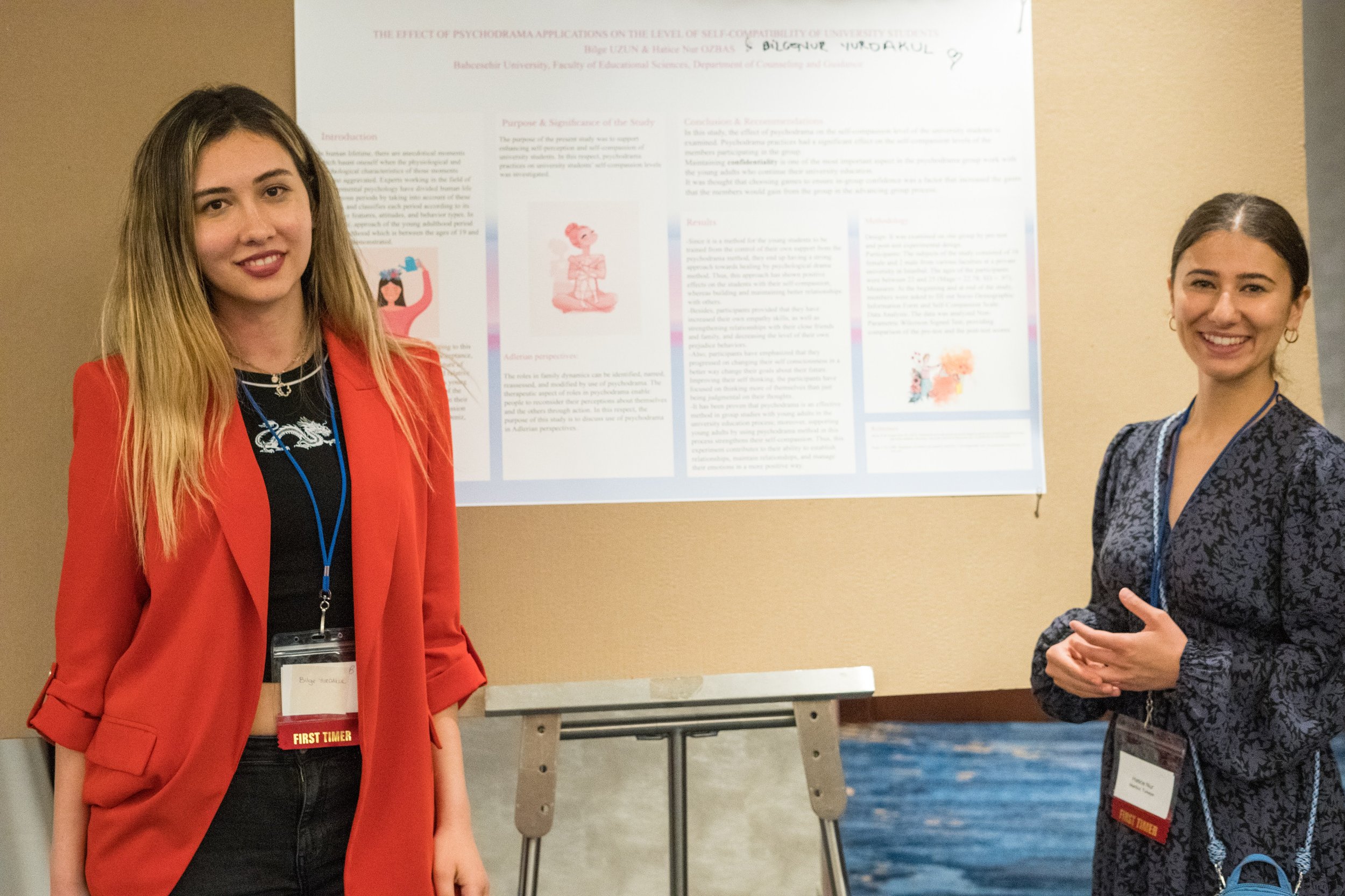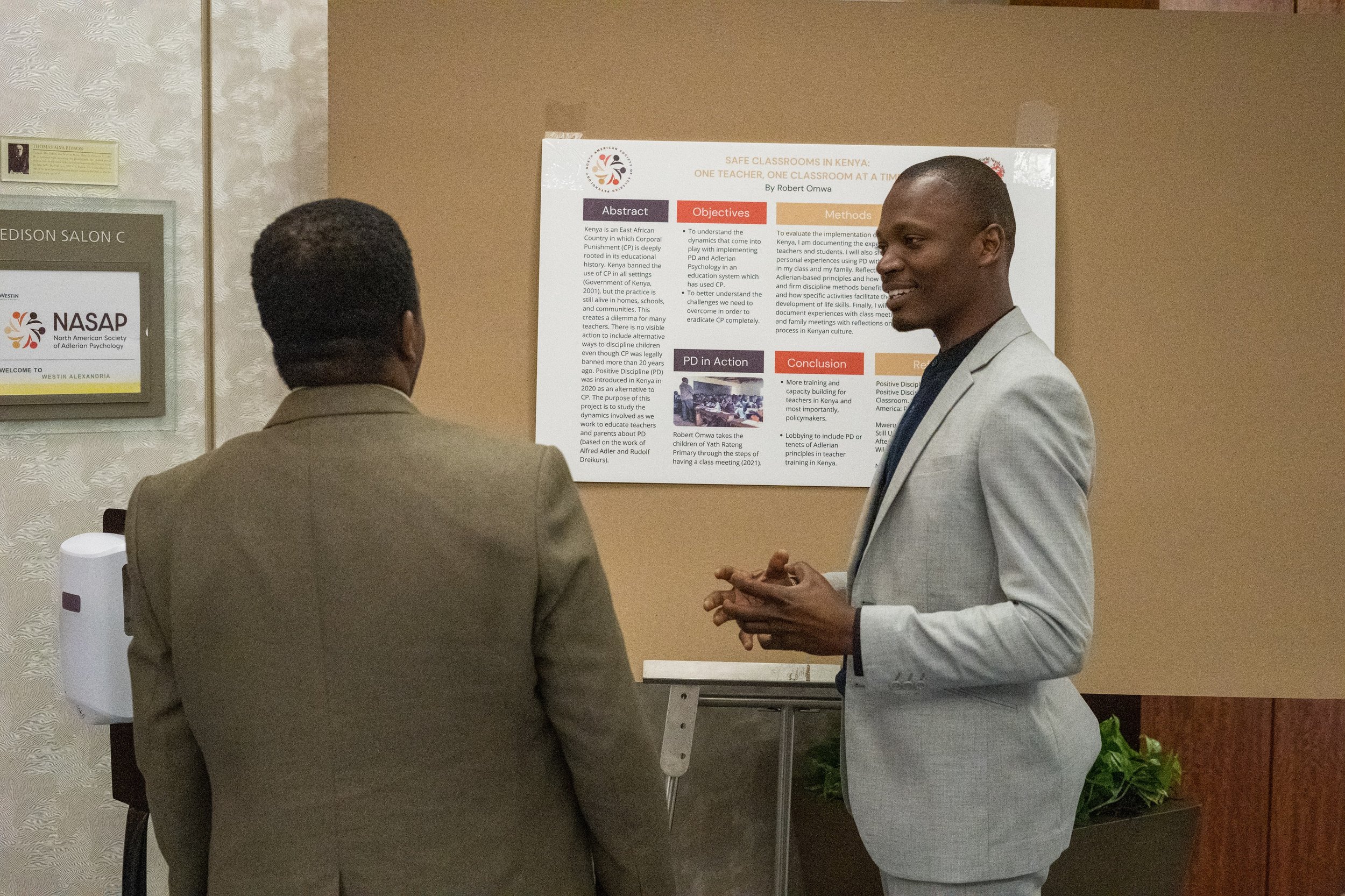Welcome to the Connection
NASAP’s Online Newsletter
December 2022 Issue
Letter from the Interim Editor
Dear Readers,
It’s officially Winter here in Seattle, Washington. It snowed the last few days and everyone is ballistic- schools closed today because of ice on the roads. As someone who grew up in Salt Lake City, Utah, this is hilarious to me. Many cities in the U.S. do not use salt to get rid of ice and snow, but Salt Lake is, well, the home of Morton Salt Corporation- and they “season” the streets there for 6 months out of the year.
I grew up the child of two people who left their religions, Catholicism and Judaism, behind. Needless to say, as an atheist child, I did not belong in Utah. When I found out that belonging was key to mental wellbeing in Adlerian Psychology, it made so much sense to me. My behavior to a great extent is in order to belong. And sometimes I shoot myself in the foot when it turns back into striving.
Today I consider myself a spiritual, somewhat agnostic witch, and a secular Buddhist. Striving in Buddhism could be called grasping. Whether it’s for superiority, or to be rid of the present moment experience, striving and grasping are unavoidable parts of life.
There is a purpose behind each of our behaviors, even the ones that seem maladaptive.
If you celebrate holidays, take this with you. Suffering is okay, and so are the ways you might try to get rid of it. Wishing your family members were different is okay. Eating too much pie is okay. Not having enough money to buy presents is okay. Snapping at your kids is okay. Everyone does it from time to time. What counts is how you clean it up. You are human. You make mistakes.
We are still all in the wake of a sustained, collective trauma. Sometimes we forget the immensity of COVID’s impact, and the lasting effects it has and will have on our bodies, spirits, and lives. Try to let yourself off the hook a little bit when you fall on your face this winter. Mistakes are the only way we learn and grow. Suffering can even serve a divine purpose… if we use it to help others.
You can be healed of depression if every day you begin the first thing in the morning to consider how you will bring a real joy to someone else.
-Alfred Adler
I hope this newsletter brings you a little joy. Consider how you may be able to contribute to NASAP through writing a brief letter of gratitude to NASAP and publish it in the newsletter. How has NASAP helped you grow? How have you transformed mistakes into something with a higher purpose? How have NASAP members touched your life and the life of the people you serve?
Happy December,
Jess Minckley, Interim Editor
President’s Address
Happy December, everyone! In my family, December starts with the birthday celebration of my younger one, then celebrating Christmas with our American friends, and a big New Year’s celebration that looks like United Nations meeting with friends from different countries. It is a month that goes slow and fast at the same time. Wishing everyone holiday celebrations that are happy, comforting, connections and filled with laughter.
NASAP Board of Directors has been busy with different tasks, visioning, and bringing visions to reality. We are working on offering virtual trainings, more online continuing education opportunities, and video processing of our conference recordings. And of course, we have been preparing for the conference in June (which, by the way, will be amazing!). The Council of Representatives members have reviewed the proposals. The presenters will be notified shortly. I am inspired by the conference proposals and humbled by the wisdom, ideas, and creativity that will be shared at the conference. I am looking forward to our gathering.
As you know, the 2023 conference is about changemaking. We are changing the pre-conference workshops to Self and Community Care Day. As Adlerians, we know very well that self-care without community and belonging does not work, or worse, can be oppressive by creating feelings of inferiority and not-enoughness*. When we announce the sessions, you will see that it will be a day filled with learning, exploring, and practicing different methods to care for ourselves and others, creating a supportive community where the self can be taken care of. Be on the lookout for announcements of this exciting opportunity at the conference.
In relation to the month of December, where we gather to connect with loved ones and with the spirit of Gemeinschaftsgefühl taking care of ourselves and others, I am hoping these quotes from two inspiring people will be good reminders for our Adlerian community.
The universe is a complete unique entity. Everything and everyone is bound together with some invisible strings. Do not break anyone’s heart; do not look down on those weaker than you. One’s sorrow on the other side of the world can make the entire world suffer; one’s happiness can make the entire world smile. Shams-i Tabrizi
Only if we think of ourselves as one with the surroundings will we establish relationships which not only benefits situations but also benefit ourselves and this extrapersonal entirety. This means that we will have to be interested in the welfare of the whole just as much as in the welfare of ourselves. - Lydia Sicher
and... Some exciting news, our Adlerian family is growing: a new Adlerian organization was established in Turkey, the Adlerian Institute of Turkey (Türkiye Adler Enstitüsü), with the leadership of Dr. Bilge Uzun. The institute plans to join NASAP as an affiliate member.
*Thank you, Marjie Longshore, for reminding me to reiterate this message of emphasizing community care.
Bengü E. Tekinalp
President of NASAP
Bengu in Denver, Colorado.
Who knows where this is?
Sign up to give a Poster Presentation at the Conference!
Would you like to give a poster presentation at the 2023 Conference in Denver?
Please sign up here:
Giving Tuesday… Only later!
If you are looking to donate to a cause for 2022, please consider donating to NASAP.
2023 Ansbacher Lecturer Announced
The NASAP COR chose the next two Ansbacher lecturers during the meeting in October. For the 2023 Annual Conference, the Ansbacher Lecture will be given by John Newbauer.
Dr. John F. Newbauer is a semi-retired counseling psychologist who consults with mental health therapists and psychologists in a variety of capacities. He taught in elementary schools, worked with developmentally delayed youth and adults, directed a sheltered workshop and residential program, and worked with a community mental health center in their life support services unit dealing with persons with chronic and severe mental illness. He served as adjunct professor for Ball State University, and as full-time faculty at the Rehabilitation Institute of Southern Illinois University and St. Francis College. He co-founded a private practice group, Phoenix Associates Inc. in 1981, which is still in operation. He was a member of the Core Faculty at Adler University for 18 years and served for 7 years as a psychologist for the Allen County Juvenile Center. Dr. Newbauer was a member of the faculty and board of ICASSI and served as its Administrator for 7 years. Dr. Newbauer holds a diplomate from the North American Society of Adlerian Psychology. He has publications on working with sexual offenders and victims, delinquents, and spirituality and mental health. He served NASAP as a member of the Delegate Assembly, Treasurer and President.
Lifetime Achievement Award Nominations
One of the highest honors that NASAP bestows on members is the Lifetime Achievement Award. In an effort to be more inclusive and open with this process, the Council of Representatives (COR) approved a process for nominating individuals for this prestigious award. This information will be posted to the website soon, but we wanted to share it now.
Lifetime Achievement Award Nomination Process
1. The nomination process will occur every fall season in advance of the Council of Representatives (COR) meeting. By two weeks prior to the Fall COR meeting (usually in October), any section, affiliate, a group of at least five general NASAP members, or the Board of Directors can send a nomination to the NASAP Office using this form.
2. The Office will send the nominations to a Lifetime Achievement Award Committee of the COR.
3. The Committee will deliberate prior to the Fall COR meeting, and then present their recommendations to the COR for a vote at that meeting.
4. The Award(s) will be presented to the recipient at the Annual Conference.
If you have someone you would like to nominate for this award, please use this form to submit your nomination. Because this process was just approved, the due date for this year will be January 31, 2023.
How to Become Controversial without Trying to
By Jeffrey A. Thomas
Reading about the life of Raymond Corsini, I have found out a couple of things. I do not think he and I would be “friends”. I want to be perfectly clear about this: What I mean to say is Dr. Corsini and I would not be seen out in an Italian restaurant in downtown Chicago or going to a lecture together in Honolulu. Let me also state that the more I read his articles, notes, and collaborative articles, he was a fantastic Adlerian theorist.
I also have empathy for much of the discrimination, bullying, and abuse that he was exposed to during his formative years as well as his academic and professional career. His mother emigrated from Italy to the United States of America in 1912 to meet her husband who went before her to secure that “better life” for them to start. By the time he was two years old, Corsini was having corporal punishment used on him by his father. Now, whenever I read any article concerning Corsini, his father, and “corporal punishment,” I replace that with what it actually was – child abuse. Corsini recounts, repeatedly in these readings, that he remembers at least two time that his father rendered him unconscious by smacking him around. Also, repeatedly, his mother would say that when his father died, when Corsini, Jr. was six-year-old, the [paraphrase] “I’m glad your father is dead, otherwise he would have killed you” (Dumont, n.d.). From this experience, Corsini was loudly a non-capital punishment proponent. For further reading on this subject, look at: Practical Parent: The ABCs of Child Discipline (1975), Effective Discipline in the Home and the School (n.d.), and Coping with Teenagers in a Democracy (1990). Corsini was also discriminated by school programs because he “spoke with an Italian accent with a Jewish inflection” (Nystul, 1984).
His academic path was riddled with starts, stops, jumps to the left, steep climbing, and rapid descents. Repeatedly, I have read that he scored very high on IQ and aptitude test, but the moment he gets into a program, he has difficulty progressing through the school’s mastery expectations and he “just gets by,” of “flunks out” (Dumont, n.d., Nystul, 1984). Then he met Rudolf Dreikurs who taught Corsini about directiveness and advice-giving. He has a profound integration of his humanistic principles and role-playing. Add in his friendship with Albert Ellis and his endorsement of Rational Emotive Behavioral Therapy (Dumont, n.d., Crosini, 1995). I am surprised that no one has tried to forensically diagnosis what type of learning acquisitional challenge Corsini may have had. His work truly has me a bit stary-eyed with the breadth and depth of his counseling acumen, his ability to write, edit, and/or contribute to journals, books, encyclopedias, dictionaries, etc.
I have figured out who reading Corsini reminds me of: Carl Whitaker. In my Family Therapy course, we watched a demonstration of Whitaker with a mother, grandmother and two boys, around 9 – 12 years of age. I also realize the flaw of my point of view: I am using my 21st century training, biases, and sensibilities to form an interpretation of these men who were at the peak of their renown in the mid 1980’s. Now, as a person of a certain acuminated years, and a cis, white male, I did not realize how non-typical I was. Whitaker and his “therapy of the absurd” made me gasp (Gehart, 2015). In the YouTube video we watched, he would say things like, “Don’t you think your mother ought to lose a 100 pounds so that she can get a man?” to her children. The mother just sat there with a forced smile on her face. I was horrified! There are ways to get a reaction without body-shaming and literally bullying the client. When reading some of Corsini’s notes and client interactions, he reminded of Whitaker. Whitaker, Corsini and even Elis are all the type of people I would not go out with socially. However, I also recognize that I can learn a lot from them. Therefore, I shall remain teachable.
Jeffrey A. Thomas, MACM, (He/him/his), is a third-Year clinical mental health counseling/forensic mental health leadership student at Adler University, Chicago. He is also the president of the Chi Sigma Iota, Alpha Iota Delta Chapter there. Jeffrey serves as a board member on the Sexual Wellness and Advocacy Group (SWAG), and is a graduate student representative of SAIGE, the Society for Sexual, Affectional, Intersex, and Gender Expansive Identities division of the American Counseling Association.
References
Cassel, P., & Corsini, R. J. (1990). Coping with teenagers in a democracy. Lugus.
Corsini, R. J. (1995). Putting the “B” in Ret: It had to be. Journal of Rational-Emotive and Cognitive-Behavior Therapy, 13(1), 5–7. https://doi.org/10.1007/bf02354554
Corsini, R. J., & Painter, G. (1975). The practical parent: Abc's of child discipline. Harper & Row.
Dumont, F. (n.d.). Going to the Edge. In Unpublished prospect for a book. introduction.
Gehart, D. R. (2015). Theory and treatment planning in family therapy: A competency-based approach. Cengage Belmont.
Nystul, M. (1984). An Interview with Raymond J. Corsini. Journal of Adlerian Theory, 40(2), 220–227.
Painter, G., & Corsini, R. J. (n.d.). Effective discipline in the home and school.
Social Justice Task Force is Becoming a Section
During the October Council of Representatives (COR) meeting, the Co-Chairs of the Social Justice Task Force brought forth the initiative to transition this task force into a more permanent group that all NASAP members can join if they choose. Kimberly Martin and Corey Frantz will serve as the first co-chairs to help oversee the process. By-laws for this new section are being finalized and many members of COR have committed their names to the 50 required by NASAP's governing documents to create a new section.
A few more general NASAP members (this includes all student members, family, retired, and all types of professional members) are needed to form this new section. If you would like to be a founding member of the Social Justice Section, please email the office at info@alfredadler.org and provide your name and that you'd like to support this section. Like all of the NASAP special interest sections, the annual membership cost for this section will be $15. Once we reach 50 members, the office will send invoices to officially join the section.
Conference Proposals Selected
The 2023 conference proposals have been selected and those who submitted one will be notified soon.
If your proposal was selected, please take note of the deadlines in the email for sending in a headshot for marketing purposes and for confirming AV needs and assigned timeslot.
This will make the planning process smoother.
An EST for IP: The Private Logic Record
by Rocky Garrison, Ph.D.
Thought records (TR) are “perhaps the most well-known tool to facilitate cognitive restructuring…” (Wenzel, 2017, p. 600), and a core component of most of the empirically supported treatments in cognitive-behavior therapy (CBT). Since their introduction by Aaron Beck and his colleagues in 1979, at least 110 TR forms have been identified, each elaborating and adapting it to various disorders and treatment approaches (Waltman, 2019). The TR presents a guide for conceptualization and intervention (Persons, 2008), defining a line of inquiry to follow along with the client, who is taught to use the TR process on an independent basis. The primary purposes of TRs are to (1) identify and explore the automatic thoughts associated with a specific event, behaviors, or change in mood, (2) evaluate the evidence for and against the identified thought, and (3) identify a new or alternative thought that is more adaptive. This is a process akin to Socratic questioning, another CBT tool for cognitive restructuring.
Despite their wide-spread use in CBT, there is little research on the efficacy of TRs as a standalone treatment or method of cognitive restructuring. Support for their efficacy is generally inferred from their inclusion in almost all CBT treatments, and therapists are encouraged to adapt and implement them based on the case formulation of each client (Wenzel, 2017). Two studies compared the therapeutic impact of TRs with behavioral experiments (BE), another core component of many CBT treatments, finding that BEs are slightly more effective in changing beliefs (McManus, Van Doorn, & Yiend, 2011) and BEs are perceived by clients as more powerful than TRs (Bennet-Levy, 2003).
This suggests an Individual Psychology adaptation of the TR, the Private Logic Record (PLR). In Individual Psychology, each person is seen as creating a unique apperceptive schema of fictions which the person acts “as if” were true as they move through life toward their fictional final goal (FFG) of significance, security, and safety. Collectively, these fictions and the FFG are the person’s life style or law of movement. This pattern of movement (i.e., behavior, emotion, and thought) is evident in all behavior, and there are numerous terms in IP to describe various facets of a person’s unique law of movement. The proposed PLR uses four, Guiding Lines, Private Logic, Immediate Purpose, and Common Sense, to explore how the law of movement is expressed in a specific incident.
Guiding Lines are like the meridian lines on a map (Griffith & Powers, 2007), orienting the person and useful in charting their course. These private meanings or convictions include interpretations of the situation and the actions of others in the situation. Private Logic is “… the fictional line of reasoning proceeding from private meaning…” (Griffith & Powers, 2007, p. 81), often used interchangeably with “private sense,” “private intelligence,” “private world,” “private intelligence map,” “personal intelligence,” and “isolated intelligence” in Adler’s writings (Dreikurs, 1973). The focus is on the personalized understanding of the convictions and thinking processes used in the situation. Immediate Purpose is the expression of the FFG in the specific situation, the fictional destination of the movement toward personal significance, security, and safety (Dreikurs, 1950/1974). Common Sense is on a continuum with private logic at the other end. All movement follows the logic of the law of movement, following the guiding lines, using the private logic, and ranging from low in Social Interest (private logic) to high in Social Interest (common sense). In the PLR this inquiry is a modification of the guiding lines, private logics, and immediate purposes that were discovered in the earlier inquiry. Specific queries for each inquiry are presented in Table 1.
Table 1: Private Logic Record Instructions
Date/Time: Be as specific as possible
Situation: What happened? Who were you with? Who said what and did what? Work at having a beginning, a middle and an ending for the incident and seeing your actions as movement. Do you have any images or memories attached to this situation? Do you see any pictures or images as you recall this incident?
Guiding Lines: What did you make of the situation? How did you read it? Go over each event in the incident and describe your evaluation and your sense of why people did what they did. What would they have to believe to have their behavior make sense? Describe any vertical movement by others that you see in the incident.
Private Logics: What were you thinking as the incident progressed? What words were in your mind in each event of the incident? How do you explain your behavior? How do you make sense of what you did? What decisions did you make as each event happened? Take responsibility for any vertical movement you make in this incident. What were you acting “as if” was true in the incident? “What would have to be true to make an otherwise particular, peculiar, and socially senseless pattern of behavior, intelligible?” (Griffith & Powers, 2007).
Immediate Purposes: What did you want from the incident? How do your actions in this incident enhance your feelings of significance, security, or safety? What purposes are expressed in your vertical movements? Where is your line of movement headed?
Common Sense: What would you have to believe to approach this situation with horizontal movement? Modify the guiding lines, private logics, and immediate purposes you have discovered to convictions that lead would lead you to be more respectful, egalitarian, and contributing. Visualize yourself acting as if you believed this.
References
Beck, A., Rush, A., Shaw, B., & Emery, G. (1979). Cognitive therapy of depression. Guilford.
Bennett-Levy, J. (2003). Mechanisms of change in cognitive therapy: The case of automatic thought records and behavioural experiments. Behavioural and Cognitive Psychotherapy, 31(3), 261-277.
Dreikurs, R. (1950/1974). The immediate purpose of children’s misbehavior: Its recognition and correction. In R. Dreikurs, Child guidance and education (pp. 5-25). [original work published in 1950]
Dreikurs, R. (1973). The private logic. In H. Mosak (Ed.), Alfred Adler: His influence on psychology today (pp. 19-32). Noyes Press.
Griffith, J., & Powers, R. (2007). The lexicon of Adlerian psychology (2nd ed.). Adlerian Psychology Associates.
McManus, F., Van Doorn, K., & Yiend, J. (2012). Examining the effects of thought records and behavioral experiments in instigating belief change. Journal of behavior therapy and experimental psychiatry, 43(1), 540-547.
Persons, J. (2008). The case formulation approach to cognitive-behavior therapy. Guilford.
Shulman, B. (1973). What is life style? In B. Shulman, (ed.) Contributions to Individual Psychology. Alfred Adler Institute.
Waltman, S. H., Frankel, S. A., Hall, B. C., Williston, M. A., & Jager-Hyman, S. (2019). Review and analysis of thought records: Creating a coding system. Current Psychiatry Research and Reviews Formerly: Current Psychiatry Reviews, 15(1), 11-19.
Wenzel, A. (2017). Basic strategies of cognitive behavioral therapy. Psychiatric Clinics, 40(4), 597-609.













